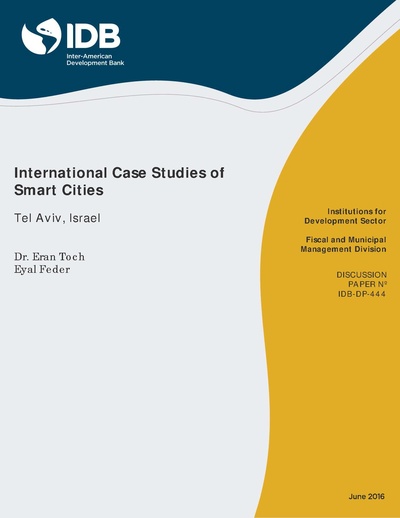DigiTel Resident Card: Difference between revisions
No edit summary |
No edit summary |
||
| (3 intermediate revisions by the same user not shown) | |||
| Line 7: | Line 7: | ||
|status=Launched | |status=Launched | ||
|sector=Data, Wellbeing | |sector=Data, Wellbeing | ||
|chapter=Interfacing with City Services and Utilities | |||
|summary=The City of Tel Aviv has undergone a transformation to become a “smart city” that uses technology to improve the City Hall administration and its citizens’ lives. Through programs such as the DigiTel Residents Club and the DigiTel mobile application, Tel Aviv offers innovative electronic services to its population and is searching ways to make citizens interested in how the city works. Throughout the process, Tel Aviv has worked closely with Microsoft to find the best ways to achieve its vision of a smart city. | |summary=The City of Tel Aviv has undergone a transformation to become a “smart city” that uses technology to improve the City Hall administration and its citizens’ lives. Through programs such as the DigiTel Residents Club and the DigiTel mobile application, Tel Aviv offers innovative electronic services to its population and is searching ways to make citizens interested in how the city works. Throughout the process, Tel Aviv has worked closely with Microsoft to find the best ways to achieve its vision of a smart city. | ||
}} | }} | ||
| Line 13: | Line 14: | ||
Tel Aviv learned that its residents, used to accessing digital services in many areas on a daily basis, increasingly expected to have the same digital services from the city. To meet these expectations, Tel Aviv has carried out a transformation into a smart city, designed to make the residents’ needs the focus of all actions by the City Hall. This smart-city strategy aims at making municipal administration more transparent and accessible, while encouraging the active participation of citizens. By engaging residents in decisions that affect their neighborhoods and their city life, Tel Aviv believes it will make better choices and become more sustainable and inclusive for all. To make its vision of a smart city a reality, Tel Aviv has been working closely with Microsoft through the CityNext initiative, which empowers cities and citizens to turn challenges into opportunities. | Tel Aviv learned that its residents, used to accessing digital services in many areas on a daily basis, increasingly expected to have the same digital services from the city. To meet these expectations, Tel Aviv has carried out a transformation into a smart city, designed to make the residents’ needs the focus of all actions by the City Hall. This smart-city strategy aims at making municipal administration more transparent and accessible, while encouraging the active participation of citizens. By engaging residents in decisions that affect their neighborhoods and their city life, Tel Aviv believes it will make better choices and become more sustainable and inclusive for all. To make its vision of a smart city a reality, Tel Aviv has been working closely with Microsoft through the CityNext initiative, which empowers cities and citizens to turn challenges into opportunities. | ||
[[File:International-Case-Studies-of-Smart-Cities-Tel-Aviv-Israel.pdf|400px|International Case Studies of Smart Cities Tel Aviv Israel]] {{#ev:youtube|1TSjefrhPBU}} | [[File:International-Case-Studies-of-Smart-Cities-Tel-Aviv-Israel.pdf|400px|International Case Studies of Smart Cities Tel Aviv Israel]] [[File:clalit_english.pdf|400px|Clalit]] {{#ev:youtube|1TSjefrhPBU}} | ||
Latest revision as of 22:44, January 24, 2023
| DigiTel Resident Card | |
 DigiTel Resident Card | |
| Team Organizations | Tel Aviv |
| Point of Contact | Liora Shechter |
| Participating Municipalities | Tel Aviv-Yafo |
| Sectors | Data Wellbeing |
| Initiative | |
| Status | Launched |
| Last Updated | February 1, 2026 |
Summary
The City of Tel Aviv has undergone a transformation to become a “smart city” that uses technology to improve the City Hall administration and its citizens’ lives. Through programs such as the DigiTel Residents Club and the DigiTel mobile application, Tel Aviv offers innovative electronic services to its population and is searching ways to make citizens interested in how the city works. Throughout the process, Tel Aviv has worked closely with Microsoft to find the best ways to achieve its vision of a smart city.
Tel Aviv is known as Israel's “city that never sleeps” due to its hectic 24/7 entertainment, restaurant, culture, sports, and tourism scenes. The city considers its residents to be its greatest assets and aims to place their needs in the center of municipal administration. “We did a survey and found that citizens love the city and its dynamic, vibrant, and endless daily events,” says Liora Shechter, Information Systems Director for the city of Tel Aviv-Yafo. “But they were not so enthusiastic about the City Hall, which they considered bureaucratic and distant. We wanted to change that impression and mobilize the residents, add more value, and create a new kind of approach to the city services.”
Tel Aviv learned that its residents, used to accessing digital services in many areas on a daily basis, increasingly expected to have the same digital services from the city. To meet these expectations, Tel Aviv has carried out a transformation into a smart city, designed to make the residents’ needs the focus of all actions by the City Hall. This smart-city strategy aims at making municipal administration more transparent and accessible, while encouraging the active participation of citizens. By engaging residents in decisions that affect their neighborhoods and their city life, Tel Aviv believes it will make better choices and become more sustainable and inclusive for all. To make its vision of a smart city a reality, Tel Aviv has been working closely with Microsoft through the CityNext initiative, which empowers cities and citizens to turn challenges into opportunities.

